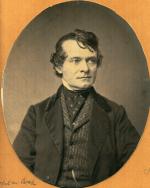Thomas Bowman (1817-1914)
Thomas Bowman was born in Briarcreek Township near Berwick, Pennsylvania on July 15, 1817. His father was a successful businessman and the family had been Methodists since Francis Asbury had converted, and later ordained, Bowman's grandfather, also named Thomas, in 1780. Young Thomas was educated in the local schoolhouse and then entered Wilbraham Academy in Massachusetts for a year, progressing to the Casenovia Seminary in New York where he studied for three years. He entered Dickinson College in Carlisle, Pennsylvania as a junior in 1835 and graduated as valedictorian of the class of 1837, the first class to graduate under the management of the Methodist Church.


